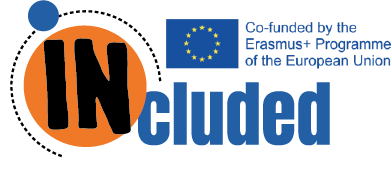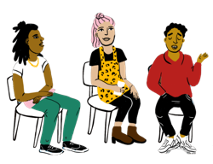“INCLUDED: Inclusive sex-ed through creative methods” is an Erasmus+ project in the field of school education that brings together the efforts of seven partners in six countries: United Kingdom, Italy, North Macedonia, Spain, the Netherlands and Greece. According to UNESCO, although the benefits of a Comprehensive Sex Education (CSE) have been widely demonstrated, there is still limited information on its impact on vulnerable groups, including young people with intellectual, cognitive and physical diversities. The INCLUDED project was created to further investigate and test suitable and effective methodologies for this target group, while accompanying schools and families toward self-knowledge and dialogues aimed at fostering a more inclusive and holistic sex education. New tools are available to equip the school system and families to achieve the goal of making sex education more present and more accessible for all students.
The INCLUDED project partnership achieved another important step, the creation of a Guide for Schools, which has two very important objectives:
- To support schools with easy-to-apply, easy-to-access guidance to reach out and involve families in sex education in a preventive, proactive and positive way;
- To support parents in playing an effective role in the sex education of their children and to partner with schools in order to achieve successful learning outcomes in relation to sex education.
This result also constitutes a fundamental open educational resource that can contribute to the well-being and social inclusion of youngsters, especially those in vulnerable situations.
The Guide comes after the creation of a sex education training programme for students and an e-learning course for teachers to support them in implementing sex education pathways. With these results, our support was mainly aimed at young people and individual teachers working in schools. The Guide, on the other hand, aims to support the entire school system in the implementation of sex education and to involve parents, as informal educators, in order to create a fundamental dialogue between these two actors and promote compliance with the proposed courses and a more effective achievement of the learning outcomes, as they are shared.
Why is it important to involve families?
In accordance with the UNESCO policy framework, for curriculum development, it is useful to organise some form of cooperation with parents, not only to secure the necessary support from them, but also to guarantee an optimal “fit” between the informal role of parents and the formal one of the schools (Stabback, 2016).
Despite the importance of the family in sex education, according to the 2018 report “Sexuality Education in Europe and Central Asia: State of the Art and Recent Development” families, as representatives of society in schools, can deter the introduction of adequate sex education programs. And the situation at this point is highly heterogeneous depending on the country under consideration.
In fact, while in the Netherlands there is hardly any social opposition to sex education, in Macedonia and the UK there is some opposition and in Spain there is serious opposition to sex education. In Italy, sex education is not compulsory in schools and, when programmes are proposed, students’ participation must be authorised by families, therefore seeking an alliance with them is crucial. In Greece, sex education courses and especially those that include Special Education are individual and rather non-systematic, therefore it is up to the family to educate and support their children on that issue.
In the case of students with intellectual, cognitive and/or functional diversities, it is even more important that the support goes both ways since parents often feel helpless when faced with the sexuality of their children.
Here the Guide developed within the Erasmus+ INCLUDED project comes timely and offers support to develop inclusive sex education workshops for families and the school community.
The Guide is available and downloadable free of charge in all partnership languages (English, Italian, Greek, Macedonian, Dutch and Spanish) at this link: https://includedproject.eu/documents-and-guides/
NOTES TO EDITORS
- Included is co-funded by the Erasmus+ Programme of the European Commission under the Grant Agreement: Erasmus+ 2020-1-UK01-KA227-SCH-094470
- It is implemented by a partnership of seven NGOs, research institute and public entities from different European countries. To find out more about the Included project and to get involved in the activities please follow the linkincludedproject.eu

